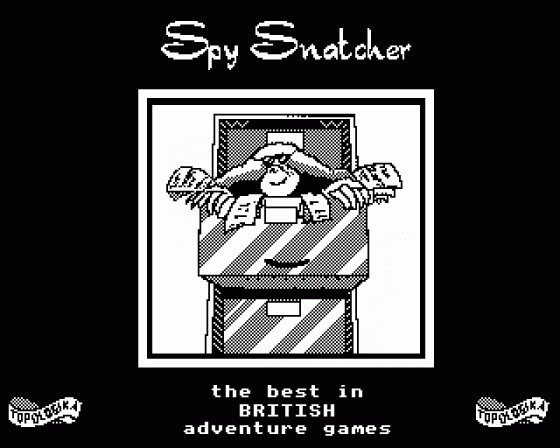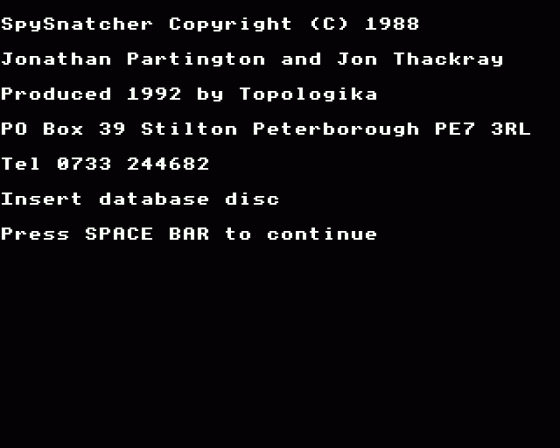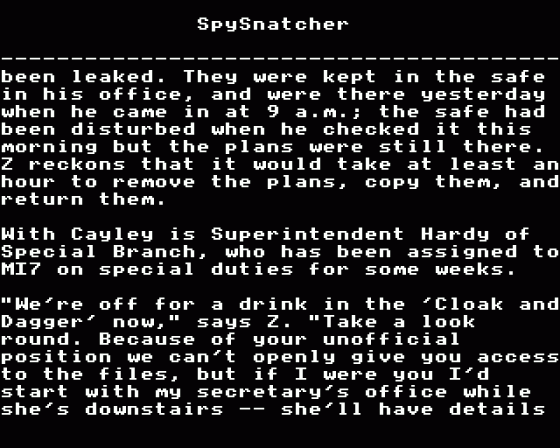
Beebug
 1st August 1993
1st August 1993
Categories: Review: Software
Author: Marshal Anderson
Publisher: Topologika
Machine: Acorn Electron
Published in Beebug Volume 12 Number 4
Marshal Anderson tries not to be economical with the truth.
Spy Snatcher (Topologika)
Having seen, in the last few months, the release of a major new graphic based adventure of the BBC computer, Blade Dancer, it's cheering to see that the good old text adventure is not being ignored by writers and publishers.
First This
If you're a relative newcomer to computers, i.e. you've bought yours in the last five years or so, it's possible that you've not come across this kind of game before so here's a brief explanation. Text adventures grew up in the late seventies on the slow, text based machines of that time, owing a lot to the Dungeons and Dragons game produced by TSR about then. The structure is one of 'rooms' which are linked, usually via compass directions, and objects which can be used in some way. The player communicates with the software in something approaching normal English through a bit of the program called a parser.
In the early games this was very limited, you could only type two word sentences like 'Go north', 'Take axe' and 'Kill troll'. At this time Scott Adams' company, Adventure International, were churning out some excellent examples like Adventureland, Voodoo Castle and Strange Odyssey for the Tandy TRS80, a 16k machine. These were all converted for the BBC and are well worth seeking out. For the BBC specifically came Philosopher's Quest, Countdown To Doom and many more, originally from Acornsoft and now handled by Topologika.
Software development soon made these games much more complex, moving from tens to hundreds of rooms and providing sophisticated parsers that could understand long and involved sentences. Two doyens of this latter type are Jon Thackray (Acheton, Hezarin) and Jonathan Partington (Kingdom Of Hamil, Avon) and they've just come up with a new one.
Spy Snatcher is based, however loosely, on a certain government-embarrassing-but-totally-boring book published a few years ago. Fortunately you don't have to read the book to play the game.
The bulk of the game take place in what is euphemistically called The Zoo, it is the headquarters of MI7. The night before the our adventure takes place someone broke into the safe in Z's office, Z being the head of MI7, and copied the secret plans for something, er, secret. Everyone in the department is under suspicion, except you, and you must find the Mole.
One of your many problems is that the investigation is unofficial, you must not get caught moving about the building and you have just one hour before the guard comes on duty. Time is calculated on a one minute per move basis so you must make the best of your first 60 actions. Once the guard is around you must constantly watch out for him; discovery will end the investigation.
The building you are in is quite large. I'm not sure I've been everywhere yet, and the descriptions are very detailed and atmospheric. One of the drawbacks here is that, because of memory limitations, the screen is in mode 7. This means that many of the long descriptions need Shift to be pressed to read them all. To get around this there are two levels of detail - you can switch between verbose and terse, or leave the setting at normal which gives a full description the first time you enter a room and a short one thereafter.
What's nice about the way the game is set up is that the bulk of the detective work takes in a comparatively enclosed environment. There aren't actually hundreds of rooms to map; it's the detail in the rooms that provides the interest. There are all sorts of desks to be opened, safes to be cracked, computers to interrogate, Dictafone tapes to be played and so on.
The game as a whole is a mixture of several genres. There's some fairly straight forward linking puzzles which hark back to the early days of adventures where you have to assemble a number of objects or find bits of information that lead to a new puzzle. There's plenty of humour. There are also some fairly cryptic, if somewhat contrived, clues which may well have you seeking help away from the computer. The most impressive part of the plot, though, is the sheer methodical detective work.
One of the problems with setting up any kind of investigation in an adventure format is dealing with characters, the software still has problems coping with all the sorts of questions players might want to ask.
Spy Snatcher gets round this really neatly by not having you question anyone, you must find your evidence through the clues that they have left behind them. Someone has been to the theatre, someone has left the country, but how do you know who they are and how can you verify these facts? It's all there, hidden in filing cabinets, word processors, waste bins - you have to look and take note.
The passage of time comes in to play too. You need to be in the right place before tapes are erased or the cleaner destroys vital evidence. While this is not in 'real time', you have to plan your moves carefully to make sure you don't miss anything.
The parser in this program is excellent, which is a great help in the early stages. Apart from the usual two word commands you can do complicated things like 'Take everything but the note pad then go north'. Having said that, I always revert to the two word approach as it is usually the most predictable - if something goes wrong you know exactly what it was. You can, of course, save your position at (almost) any time which helps you try things out.
To save on the frustration level there is on-line help throughout the game, though it can only be reached via the manual to stop you using it at every turn; it is, after all, cheating. The text is held on disc which provides such a wealth of description; it is accessed very quickly and I never found it irritating.
If you're looking for an alternative to all those bright colours and loud noises Spy Snatcher has to be for you. It'll keep you busy for weeks and you'll get a real feeling of satisfaction when you complete it.
Other Reviews Of Spy Snatcher For The Acorn Electron
Spy Snatcher (Topologika)
A review by Jonathan Partington (EUG PD)
Scores
Acorn Electron Version| Overall | 82% |
Scores
BBC B/B+/Master 128 Version| Overall | 82% |






